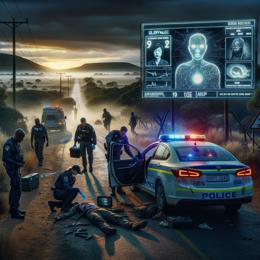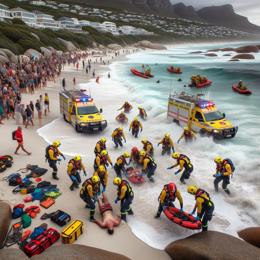Image created by AI
Ensuring Child Safety on Cape Town Beaches Amid Issues with Drunk Parents
As festive decorations light up Cape Town, the city's beaches, a popular destination, face a recurring challenge — ensuring child safety against the backdrop of adults consuming alcohol, despite bans. The City of Cape Town is pushing considerable efforts through its Identikidz programme to mitigate potential risks to children this holiday season.
Alcohol consumption on Cape Town beaches is strictly illegal. However, instances of intoxicated beachgoers, particularly parents, have been recurrent. These adults often neglect adequate supervision of their children, contributing to increased dangers at these communal spaces. This behavior not only jeopardizes their own safety but also distracts lifeguards from their primary role of overseeing the wellbeing of all visitors, exacerbating the risk of accidents on crowded beaches.
To confront these issues head-on, the City’s Community, Arts, and Culture Development Department is actively promoting the Identikidz programme which aims to ensure the safety of minors. This past weekend alone saw significant progress, with over 10,756 children being tagged with identification wristbands across 15 beaches. This simple yet effective measure led to the quick reunification of nine lost children with their families — with Strand Beach recording the highest number of tags, followed by Mnandi and Muizenberg.
Councillor Patricia van der Ross, Mayoral Committee Member for Community Services and Health, has highlighted the importance of this initiative. She stated that with the anticipated increase in beach goers due to rising temperatures and upcoming public holidays, the Identikidz service becomes crucial. Last season’s figures underscore the programme's success: a total of 133,730 children were secured with identification over five key weekends, and 302 were reunited with their families.
The process is streamlined to enhance both ease and safety. Children accompanied by adults to the beaches are encouraged to visit the Identikidz registration desks upon arrival. There, dedicated staff members register the children and issue them with the tags that contain contact details used solely for reunification purposes, guaranteeing confidentiality.
Furthermore, Identikidz staff work in collaboration with various governmental bodies, including the South African Police Service, to manage the recovery of lost or displaced minors effectively.
In light of these continued efforts, Councillor Van der Ross has reminded the public that “Your safety, and that of your family and friends, on the beach is first and foremost your own responsibility.” The Identikidz programme is there to support, but the primary duty remains with individuals to follow the laws and guidelines that keep public spaces safe for everyone.










